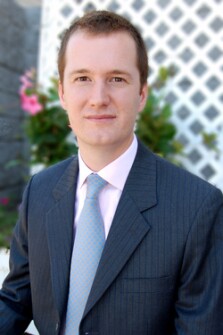
At only 29, Matthew Chingos has already conducted research with some of the nation’s leading education researchers and on some of the most pressing education policy questions, including issues related to teacher effectiveness, accountability, and higher education attainment. His first book, Crossing the Finish Line: Completing College at America’s Public Universities (co-authored with William Bowen and Michael McPherson) was published by Princeton University Press in 2009.
Raised on the North Fork of Long Island, Chingos earned both a bachelor’s degree and Ph.D. in government from Harvard, and is currently a Fellow at the Brown Center on Education Policy Studies at the Brookings Institution. He and his wife live in Washington, D.C.
How did you come to do research focused on education issues? What do you find interesting about education?
I’ve been interested in education issues since high school because my mother, father, and stepmother were all public school teachers. I had a lot of opinions but didn’t know anything about research or even really what research was. In college, I knew I wanted to write a thesis and thought that education would be a good topic, so during my junior year I took an economics of education class with Caroline Hoxby and an education policy class with Paul Peterson. It was then that I realized that education debates--and policy debates in general--weren’t just about conflicting opinions but that there were some questions that could be answered with empirical evidence. I found I really enjoyed doing that kind of research, and ended up writing a senior thesis with Peterson and Hoxby as advisors. Early in my senior year, I asked Peterson for a letter of recommendation for law school (my plan since high school) and he encouraged me to consider graduate school. I quickly realized that he was right, and fortunately was able to sneak into Harvard’s political science Ph.D. program even though education research is outside of mainstream political science.
What research questions in education do you find most interesting?
I am interested in research questions that might produce policy-relevant evidence and that I don’t think have been addressed adequately, if they have been addressed at all. For example, in graduate school I became interested in the question of whether better teachers have better earnings opportunities outside of education. My collaborator Marty West and I were able to obtain education data from Florida that are linked to unemployment compensation records, which enabled us to answer that question. We found that teacher value-added to student test scores is correlated with the earnings of former teachers (i.e., after they left teaching), although it is not correlated with those same teachers’ earnings while they were in the classroom. Right now, Russ Whitehurst and I are working on a report on the importance of instructional materials. This is a subject that has received scant attention--in most states, you can’t even find out what instructional materials are used overall, much less by school--despite evidence that the quality of the curriculum may matter as much as or more than teacher quality. And of course it’s easier to change the instructional materials used by a school than it is to change teacher training, recruitment, and retention policies.
I’ve also done research outside of my primary education areas of focus, including one project on public opinion on education (examining the relationship between citizens’ subjective ratings of their local public schools and objective data about the schools including performance measures) and another ranking Ph.D. programs using the Google PageRank algorithm and data on placements into faculty positions.
What experiences, individuals, or books have most influenced your thinking about education?
My experiences first studying and later collaborating with many terrific education researchers have most influenced my thinking. As I mentioned earlier, I wouldn’t have gotten involved in education research were it not for Caroline Hoxby and Paul Peterson. After college, I had the great opportunity to study higher education at the Mellon Foundation with Bill Bowen. Our study of college graduation rates was published a few years later as a book that Bowen and I wrote with Mike McPherson, another great collaborator. In graduate school, I was fortunate to be able to continue working with Paul Peterson and Marty West. In the year since I’ve joined Brookings, I’ve learned a tremendous amount from working with Russ Whitehurst.
What do you see yourself doing 10 years from now?
It’s hard to say. If you asked me that question ten years ago, I would have said that I planned to go to law school and maybe go into politics. Assuming I don’t make another course correction, I could imagine being at a think tank, in academia, or in government at the state or federal level.
What do you do for fun?
Last year while I was living in Puerto Rico (my wife had a job there), I got a private pilot license. Another pilot and I recently went in on a 1959 Piper Comanche (a single-engine, four-seat airplane) and I have been spending most weekends getting comfortable flying it. I’m looking forward to taking trips to New England this summer and down south next winter. My other hobby as of late is trying to improve my Spanish, which I learned in high school but never became fluent in (despite living in Puerto Rico for a year), by taking classes and watching telenovelas.